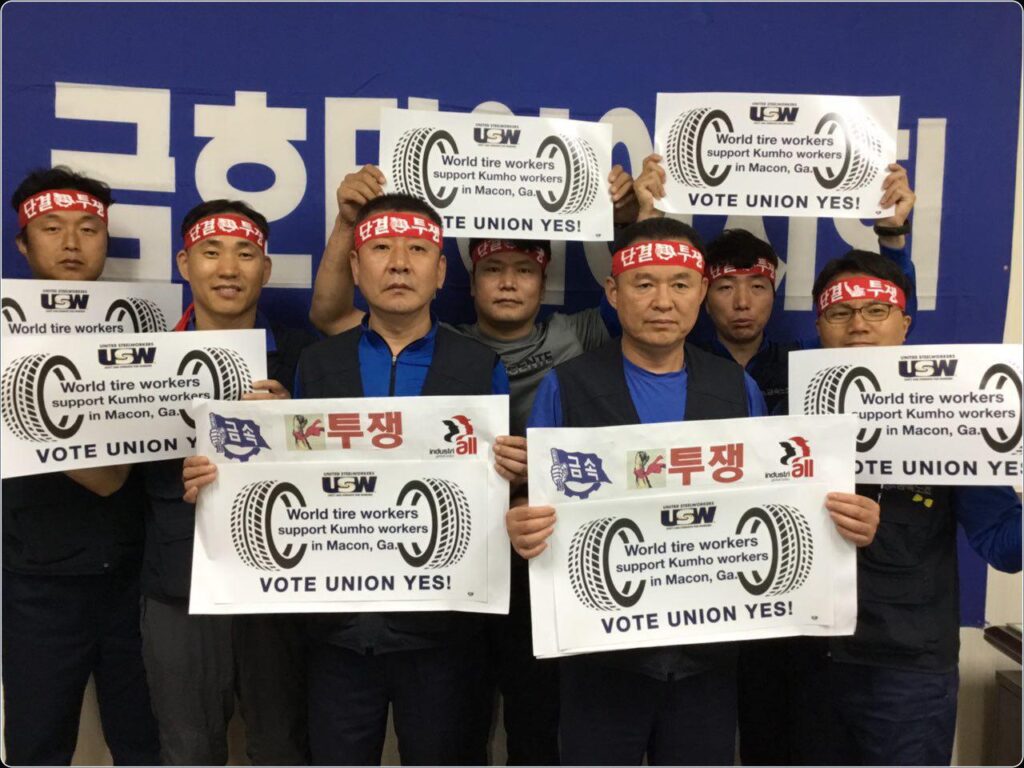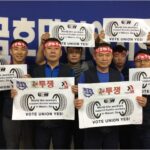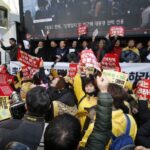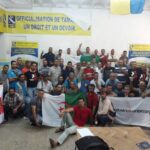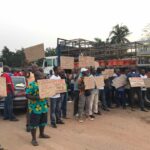24 April, 2018Union busting is arguably the biggest threat to trade unions the world over. As unions come under attack from companies, governments and corrupt judiciaries, union-busting tactics are becoming increasingly sophisticated and no less severe
Text: Leonie Guguen
Union repression is symptomatic of increasing global inequality and corporate greed. It is no wonder that global forces seek to suppress trade unions, which are economic actors in the redistribution of wealth from capital to labour. IndustriALL Global Union affiliates are no strangers to these attacks.
USA
When IndustriALL affiliate, the United Steelworkers filed an election petition at Kumho Tire in the USA, the company immediately launched a campaign to destroy workers’ chances of union representation that is typical in the American South.
Kumho Tire in Macon, Georgia, which supplies tyres for auto manufacturers including Chrysler, Hyundai and Kia, hired a consultancy firm, RoadWarrior Productions, paying them at least US$300,000 to employ seven full time union busters at the plant.
Kumho Tire set up an anti-union website, which included a message from the mayor of Macon urging workers to vote against the union. The site has since been taken down.
Workers were forced to attend daily anti-union meetings that lasted for several hours, with managers telling them that the newly-opened factory would be forced to close if they voted for a union. The Korean multinational is currently under control of a committee of creditors headed by the state-run Korea Development Bank, and plant managers emphasized this to play on workers’ fears.
Workers were also made to attend many one-on-one anti-union meetings:
“We have a recording of the company human resources manager threatening loss of customers and plant closures if they unionize. We also have witnesses who will testify they were told one-on-one that if they supported the union they would be fired,” said a spokesperson from the United Steelworkers.
Before the relentless campaign of intimidation and scaremongering at the Macon plant, 80 per cent of workers at Kumho Tire signed cards saying they wanted a union. When the vote took place on 12 and 13 October 2017, the USW lost the election by 28 votes (164 to 136) – a drop of 34 per cent in favour of a union.
Not satisfied with the election result, Kumho Tire then fired Mario Smith, one of the leaders of the organizing campaign, just days after the vote. The Steelworkers have retaliated by filing unfair labour practice charges with the National Labour Relations Board. If successful, the election would be re-run or the company could be ordered to bargain with the union.
It’s worth noting that virtually all 3,700 Kumho Tire works in South Korea are organized by IndustriALL affiliate the Korean Metal Workers’ Union.
Anti-union discrimination is rife in the southern states of the US, even at companies that normally engage in social dialogue such as Nissan, Boeing and Airbus. German car manufacturer, Volkswagen, which has good relations with unions in its home country, is actively fighting the US legal system to stop workers from organizing at their plant in Chattanooga, Tennessee. IndustriALL’s global framework agreements with both Volkswagen and Airbus have had little sway in the US.
South Korea
South Korean companies are well-known for their anti-union activities abroad, but union-busting in South Korea is entrenched and severe. Han Sang-gyun, president of the Korean Confederation of Trade Unions (KCTU), has been imprisoned since December 2015, while former KCTU general secretary, Lee Young-joo, was arrested in January 2018 and is now held in the same detention centre in Seoul.
Sister Lee had been seeking refuge at the KCTU office for two years after an arrest warrant was issued for her role in organizing the People’s Mass Mobilization on 14 November 2015 against the repressive labour reform of the former government.
While mobilizations by a broad alliance of unions and civil society succeeded in removing President Park in March 2017, Lee and Han Sang-gyun were not among the many thousands of people pardoned by the new administration under President Moon Jae-in.
IndustriALL has visited and met Han and Lee several times since 2015 as part of its global solidarity with South Korean union movement.
In April 2017, the UN Working Group on Arbitrary detention considered the case of Han and Lee and reminded the Korean government that it has “the responsibility, including in the context of peaceful protests, to prevent arbitrary arrest and detention, and called upon States to avoid the abuse of criminal proceedings at all times”.
Aside from the authorities, trade unions in Korea have an ongoing battle against brutal attacks on workers’ rights in the all-powerful, family-owned companies in the country (known as chaebols) such as Hyundai and Samsung.
Algeria
Governments are taking scant notice of international labour conventions designed to protect trade union rights, even when their country has ratified them. Algeria signed the International Labour Organization’s (ILO) Convention 87 on the right to freedom of association and Convention 98 on the right to organize and collective bargaining in 1962.
And yet a powerful alliance of government, enterprise and the judiciary is determined to crush independent unions in Algeria, including SNATEGS, affiliated to IndustriALL. SNATEGS represents more than 30,000 workers at state-owned gas and electricity company Sonelgaz, whose demands for higher wages and better health and safety have been met with extraordinary reprisals.
Since the union was registered in 2013, SNATEGS and its leaders have been subject to increasing oppression and judicial persecution. In December 2016, SNATEGS President, Raouf Mellal, who was fired by Sonelgaz for union activities, was sentenced in absentia to six months in prison after he blew the whistle on the illicit overcharging of eight million Sonelgaz customers over a ten-year period.
Five months later, the Minister of Labour withdrew SNATEGS’ registration just days before a nationwide strike by Sonelgaz workers. In a letter dated 16 May 2017, the Minister said the union had disrespected the Algerian law 90-14/1990 without detailing how. It also said Mellal had been dismissed from his role as union president.
He has since been convicted to a total of 17 months in prison and fines of 10,000 euros (US$12,300) on a plethora of spurious convictions. He is currently not in custody and appealing the charges.
Judicial persecution has extended to other members of SNATEGS. The general secretary and other senior leaders of the union and even the lawyer representing SNATEGS are now facing trumped up charges.
Security forces have been employed on numerous occasions to stop the union organizing rallies. On 20 January this year, around 10,000 Algerian police officers were employed to stop a peaceful rally organized by SNATEGS in the capital, Algiers. They detained some 1,000 would be protestors, who were taken by bus to remote areas and denied food and water for ten hours. Security forces confiscated their phones and deleted photos of the rally, as well as evidence of police oppression that took place. According to SNATEGS, some women protestors were sexually harassed and other trade union members were physically assaulted.
Global unions, IndustriALL, IUF, PSI and the ITUC wrote to the Algerian labour minister, Mourad Zemali, to condemn the treatment of the protestors, who were a mix of trade unionists and civil society sympathetic to the workers’ demands.
In February 2018 an ILO direct contact mission to Algeria was cancelled following the government’s refusal to allow the mission to meet with independent unions.
Bangladesh
In December 2016, the Bangladesh government used wildcat strikes by garment workers demanding higher wages as an excuse to launch a major crackdown on trade unions in the sector. Thirty-five trade union leaders and garment workers were seized and arbitrarily detained for several weeks. Union offices across garment producing areas near the capital Dhaka were shut down and vandalized by authorities. The Bangladesh Garment Manufacturers and Exporters Association (BGMEA) suspended production at 59 factories and more than 1,600 workers were suspended. Police filed charges against 600 workers and trade union leaders.
The wholescale attack on the unions was met with a strong response from the trade union movement. IndustriALL mobilized an international solidarity campaign #EveryDayCounts supported by UNI Global Union and affiliates worldwide.
Hundreds of photos from all over the world were posted on social media, and unions in more than 20 countries sent letters to the Bangladeshi Prime Minister, Sheikh Hasina, calling for the release of the detainees. Trade unions protested and visited Bangladeshi embassies in over 16 cities, while a LabourStart campaign to free the jailed activists amassed more than 10,000 signatures.
Finally, on 23 February 2017, after two months of captivity, a tripartite agreement was reached between IndustriALL Bangladesh Council, the Ministry of Labour and the BGMEA, providing the release of the arrested trade unionists and garment workers, and all the cases against them to be dropped.
However, despite the breakthrough, relations between factory owners, the government and trade unions in the Bangladeshi garment sector remain on a knife-edge. Just six months after the trade unionists had been released, 50 garment workers were badly beaten by a gang of thugs for taking part in a peaceful protest at sweater manufacturer, Haesong. The sit-in and strike outside the Korean-owned company’s headquarters in Hizalhati, Gazipur, was organized by IndustriALL affiliate the National Garment Workers Federation (NGWF).
Among those injured were the union’s general secretary and vice-president who are both women. An NGWF organizer was kidnapped and released many hours later. Despite multiple requests, local police have refused to file workers’ complaints about the kidnapping or the attacks.
It is this impunity that makes trade union organizing perilous in Bangladesh.
The Philippines
People working in complex global supply chains are particularly vulnerable to rights violations, poor health and safety, and low pay. Accountability is low in what is a hidden workforce for multinational companies and trade unions often unwelcome.
Furukawa Automotive Systems, a Japanese-owned company in the Philippines makes car parts for major automobile brands such as Toyota, Suzuki, and Nissan, from its plant in Lipa City, south of Manila.
Workers at Furukawa secured a victory in January this year after voting by a large margin to be represented by a branch of IndustriALL affiliate the Philippine Metalworkers Alliance (PMA). Close to 1,500 workers out of a workforce of 5,000 voted for a union, of whom more than 50 per cent are agency-hired or non-regular.
The fight for union recognition at Furukawa was gained with support of trade unions led by PMA, the Japan Council of Metalworkers’ union, as well as global union federations and other organizations.
However, despite the fact that PMA won the certification election, union-busting continues at the company. Another union, supported by the company, is delaying the process of collective bargaining by going to the labour court to claim that they have also members in Furukawa. Until the intervention of this union is resolved, there can be no negotiation of a collective bargaining agreement.
Colombia
Like the Philippines, Colombia is ranked by the ITUC as one of the top ten world’s worst countries for workers’ rights, providing an easy environment for companies to attack trade unions.
TuboCaribe, owned by multinational steel producer Tenaris, manufactures steel tubes from a plant in the Caribbean port of Cartagena. After refusing to sign a new collective agreement with workers, TuboCaribe sacked both the president and vice-president of the Workers’ Union of Tenaris in Colombia (Sintratucar) in December 2017. TuboCaribe then refused to rehire twenty young people who had been working on rolling six-month contracts after they joined the union.
This prompted 100 more workers to leave Sintratucar for fear of losing their jobs. In contrast, these workers had their contracts renewed.
“The reason for my dismissal is the formation of the union,” said Sintratucar president Walberto Marrugo. “Tenaris does not respect freedom of association. We are trying to annul the dismissals through the legal system but we will go to an arbitration tribunal and take other actions if necessary.”
On learning of the dismissals, IndustriALL’s Tenaris/Ternium Global Union Network launched a campaign in support of the dismissed workers and union leaders. Sintratucar held a series of protests and a mass meeting of members at the factory gates on 17 December. The meeting called on workers throughout the world to increase their pressure on the company by joining a Facebook campaign. Sintratucar also urged all Tenaris employees to make a video illustrating the company’s union busting activities and to demand the reinstatement of the dismissed workers.
Following legal action by the union, the municipal justice of Cartagena ordered TuboCaribe to reinstate the vice-president of Sintratucar, Jairo del Rio, citing no just reason for his contract to be terminated. It was a key victory but the union’s president Walberto Marrugo and the other young workers are still fighting for their jobs.
Russia
A recent decision by a Russian court to dissolve the Interregional Trade Union Workers’ Association (ITUWA), has been described as a serious blow for independent unions in Russia.
On 10 January 2018, the local court of Saint Petersburg ruled that IndustriALL affiliate, ITUWA, should be dissolved claiming the union had conducted political activities and received foreign funds.
ITUWA brings together 4,000 workers from the automotive and other industries. According to the prosecutor’s office, the decision was based on ITUWA’s solidarity support for truck drivers protesting against tax increases and the union’s criticism of the government’s socio-economic policies on its website.
The court also included the inter-sectoral nature of the union’s membership and activities as part of the reasons for its decision, as well as receiving foreign funds for taking part in joint workshops with IndustriALL.
Eight IndustriALL affiliates in Russia issued a joint statement in defense of ITUWA, which was sent to the State Duma, the Prosecutor’s office, chairperson of the Supreme Court and the President of Russia. It said:
“The Saint Petersburg city court decision, in our opinion, not only blatantly violates the rights of workers and the trade unions representing their interests. It also moves the proper regulation of trade union activities in Russia out of national and international legal frameworks.”
ITUWA has appealed to the Supreme Court of Russia and is preparing for further trials.
Ivory Coast
Not long after Moroccan energy group, Akwa, acquired an 80 per cent stake in Ivorian fuel distribution company Klenzi in December 2014, workers began to feel the full force of its anti-union policies.
Klenzi has shown a complete lack of respect for the labour laws, the labour inspectorate and the Labour Ministry of Côte d’Ivoire in trying to oust IndustriALL energy affiliate SYNTEPCI.
Trouble began in September 2015, when Klenzi refused to allow elections of worker representatives because it would have meant obtaining a list of candidates from SYNTEPCI and recognizing the union at the company. Eventually, following an arbitration meeting organized by the labour inspectorate in May 2017, Klenzi’s CEO Ali Boutaleb refused to sign the minutes of the meeting.
After that, workers were subjected to all forms of threats and harassment to intimidate them leaving SYNTEPCI. After three employees refused to draw up a list of workers to target, the CEO himself wrote to employees on 5 July 2017 asking them to renounce their affiliation to SYNTEPCI. It soon became apparent the company was forcing employees to sign the letter under duress, which lead SYNTEPCI general secretary, Jeremy Wondje, to make an urgent complaint to the labour inspector.
The labour inspectorate called for a meeting between the parties on 3 August but Klenzi management failed to turn up. The workers who attended the meeting were sanctioned with written warnings for leaving work without permission.
After continuous intimidation one of the ten workers that had refused to sign the letter renouncing affiliation to SYNTEPCI, sent an SMS to his colleagues revealing that he had bowed under pressure, saying: “Hello comrades, truly I am weak, I couldn’t hold out. I signed. My apologies.”
Out of the nine remaining employees who refused to sign the letter renouncing their affiliation to SYNTEPCI, eight have been fired.
When the CEO’s secretary also refused to sign, she was sent to work as a pump operator at the Tongon mine in Korhogo, where Klenzi delivers fuel.
On 31 January 2018, SYNTEPCI held a three-day strike to protest at the violations of freedom of association at Klenzi, as well as problems with other oil companies in Côte d’Ivoire. However, the situation remains unresolved.
THE WAY FORWARD
Governments must recognize the legitimate and essential role of trade unions in redressing inequality, increasing prosperity and enlarging the tax base through higher wages. They must also do more to protect unions, says IndustriALL General Secretary, Valter Sanches:
“Too much power in the hands of multinational companies – that indulge in union busting to protect their bottom lines – has negative impacts on entire communities and societies. Governments need to push back against corporate greed, and that includes defending the right of freedom of association through strong action.”
There is a glimmer of hope as a new generation of workers, faced with precarious work and low wages, realize that collective action is the best way of defending their interests. In 2017, there were 262,000 new union members in the USA, of whom 75 per cent were aged under 35. Some of the biggest gains came in organizing drives led by women and people of colour.
“The more trade unions can grow by appealing to young people and women, the stronger they will be to counter union-busting attacks,” concludes Sanches.
